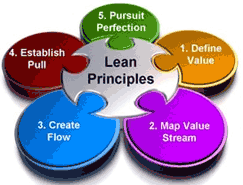The following column comes through special arrangement with the Lean Enterprise Institute. It was authored by Lean expert Jeffrey Liker of the University if Michigan.
"Like any author I have my pet peeves about the way readers and reviewers interpret my books compared to my intentions. One of my biggest is accusations that I am a biased Toyota lover and do not believe they can do anything wrong. Toyota is supposedly a perfect company that always does everything right and I am advocating that every organization should try to be like Toyota.
Nothing is further from the truth.
Supply Chain Digest Says... |
 |
| Toyota knows the principles do not change, but specific practices should always be evaluated and improved if possible. |
 |
What do you say? |
| Click here to send us your comments |
 |
| Click here to see reader feedback |
|
|
I have spent enough time in Toyota to hear many complaints from Toyota managers about the company, and to learn of many chinks in the armor.
Toyota is made up of people with all of our imperfections. Even when we take tours of Toyota plants they openly share periods where they went backwards on key principles such as failing to regularly update standard work as improvements are made, managers who focus on making the numbers instead of using metrics for improvement, cases where the repair bay is quite full and defects are not being caught in process, and more.
Toyota also backtracks on some "best practices." On one visit I will see kitting where all the parts needed for a car are put on carts so the assembler need only use what is there. That is supposed to be an improvement over having boxes of each part on a rack so assemblers need to walk to the rack and select parts needed for a particular car, for example, select the right color and type of seat belts for a car.
Then one year later I might see that they went back to the boxes of parts on racks because they had gone too far in kitting and there was too much labor trapped into kitting the parts.
Toyota is happy to share that they tried something, learned what went right, and what went wrong, and then changed what they do.
Continuous improvement is always some steps backward and hopefully more steps forward. The poor unassuming visitor benchmarking Toyota may see a "best practice" and try to copy it, while for Toyota it was a failed experiment.
Even Toyota factories do not blindly copy other Toyota factories. After all, all the plants have similar processes to stamp, weld, paint, and assemble. But Toyota sensei will tell you that TPS should really stand for "Thinking Production System." They want people to think. Copying is not thinking. Toyota could try to enforce best practices from headquarters so everyone does things the same way, but then continuous improvement would die. They would get compliance not thinking.
They are happy to explain that the principles do not change, but specific practices should always be evaluated and improved if possible. A given factory will be very much aware of what others in the region are doing, through regular visits and joint benchmarking, but benchmarking is intended to get ideas.
(Article Continued Below)
|
CATEGORY SPONSOR: SOFTEON |
|
|
| |
|
|
They are happy to explain that the principles do not change, but specific practices should always be evaluated and improved if possible. A given factory will be very much aware of what others in the region are doing, through regular visits and joint benchmarking, but benchmarking is intended to get ideas.
 Any ideas a manager brings home from another plant should consider differences in the context, differences in specific equipment, and the priorities of the home plant. What are our problems? What should we be focused on? Will these ideas possibly help us in what we are trying to accomplish? If the answer to these questions are all yes, then the home plant will experiment on a small scale with the ideas, adapt them, improve them, and communicate what they are doing to the plant they benchmarked. Any ideas a manager brings home from another plant should consider differences in the context, differences in specific equipment, and the priorities of the home plant. What are our problems? What should we be focused on? Will these ideas possibly help us in what we are trying to accomplish? If the answer to these questions are all yes, then the home plant will experiment on a small scale with the ideas, adapt them, improve them, and communicate what they are doing to the plant they benchmarked.
Toyota is an exceptional company. The way of thinking is a model to learn from. But copying Toyota’s culture is impossible and ill advised. How can Toyota as a model help you develop a vision for your organization? What can you learn from the principles? What specific, high priority goals are you working on and how can ideas from Toyota possibly help? There are no "solutions" from Toyota, only ideas.
What is your reaction to this provocative article? Do some companies confuse Lean Practices versus Principles? Let us know your thoughts at the Feedback section below.
Your Comments/Feedback
|